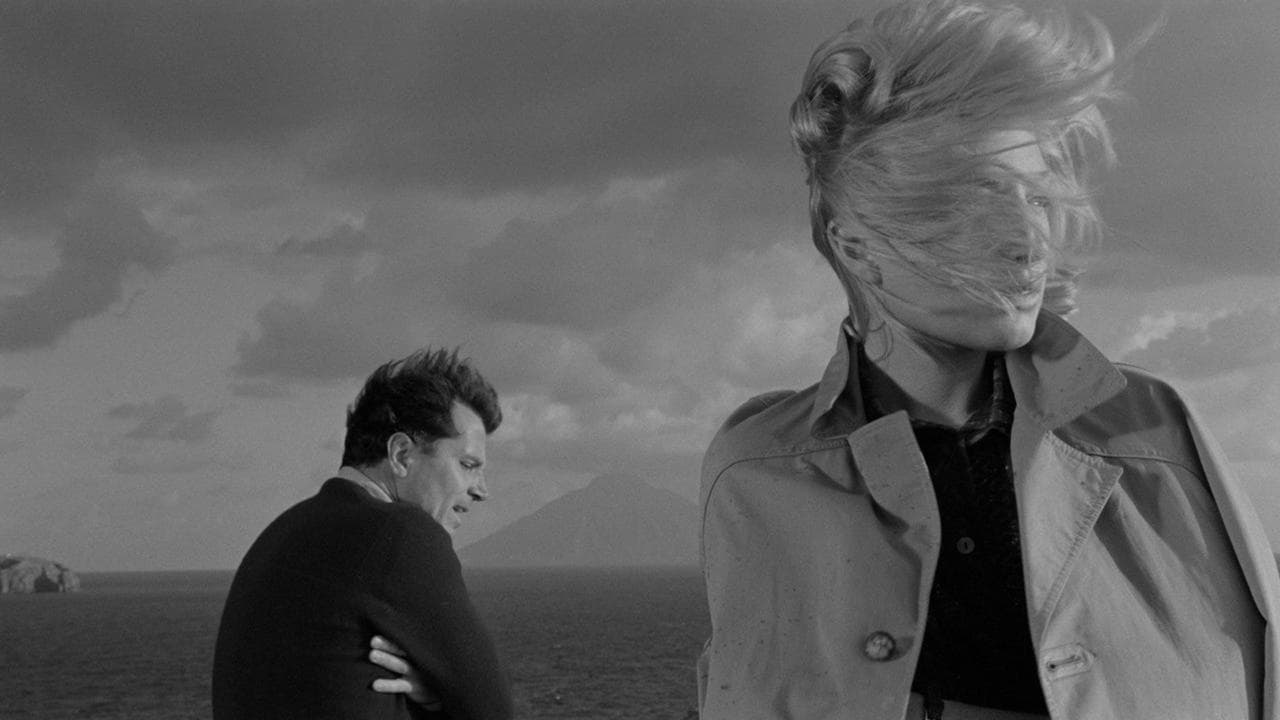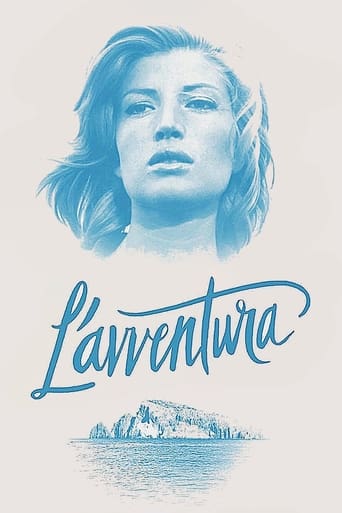Diagonaldi
Very well executed
Billie Morin
This movie feels like it was made purely to piss off people who want good shows
Janae Milner
Easily the biggest piece of Right wing non sense propaganda I ever saw.
Guillelmina
The film's masterful storytelling did its job. The message was clear. No need to overdo.
monsieurchariot
If you have never seen the luminous Italian actress Monica Vitti in a film, you simply must rent this one. Imagine Faith Hill with a Neapolitan profile, a Catholic (as opposed to Protestant) guilt complex and an earthy, almost boyish exuberance. L'Avventura, translated in English to mean The Adventure, is the story of a woman (Vitti) who joins her best friend, her best friend's lover, and a gaggle of wealthy Italians on a boat trip near Sicily. The best friend mysteriously disappears during an excursion to a barren island in the Mediterranean. The remainder of the film involves Vitti's search for her friend, as clues point to the possibility that she left the island on a boat and is spotted, via missing-persons and newspaper reports, here and there on the mainland. Vitti is intermittently joined by the misplaced woman's lover (Gabriele Frezetti), with whom she falls in love against her better judgment.L'Avventura and La Dolce Vita were released in the same year and have similar themes: they both focus on the emptiness of the very wealthy and a fruitless search for sensual pleasure. Antonioni's film captures the milieu with a unique style, oddly framed camera angles, full depth of focus in every shot, a meandering pace and virtually no music. The film does not have a plot in the conventional sense, and to me seemed like two stories in one. Essentially, it is the study of a woman drowning in an emotionally bankrupt social strata. Lonely, gentle readers will no doubt see their own emotional bankruptcy reflected in this brilliant Italian masterpiece.
Lee Eisenberg
"L'avventura" is the start of Michaelangelo Antonioni's unofficial trilogy about modernity and its discontents. That Anna's (Lea Massari) disappearance never gets solved highlights an important point: things do not always have a purpose. Sometimes, things just happen. It is amid this cynical outlook on life that Sandro (Gabriele Ferzetti) and Claudia (Monica Vitti) start up a relationship. Alienated by a world filled with excesses, they find only each other.I can't help but wonder if "L'avventura" influenced Terry Gilliam's movies. A frequent theme in his movies is the desire to escape our overly commercialized society (as seen in "Time Bandits" and "Brazil"). Whether or not it did, this is an undeniable masterpiece. Like Federico Fellini, Michelangelo Antonioni took Italian cinema in a direction that would ensure the production of some of the greatest movies. This is one that you should see.
davikubrick
By the time Michelangelo Antonioni released "L'avventura" a lot of important and revolutionary European films were being released such as "Pickpocket" by Robert Bresson, "The 400 Blows" by François Truffaut, "Hiroshima Mon Amour" by Alain Resnais, "Breathless" by Jean-Luc Godard and "La Dolce Vita" by Federico Fellini, and "L'avventura" certainly deserves a high spot between those revolutionary European film. The film tells the story of Anna(Lea Massari)a young woman who can no longer endure her meaningless bourgeoisie life and simply fades away without trace, then a discouraged search starts to find her but it only leads to nothing, except an doomed relationship between Anna's best friend Claudia(Monica Vitti)and Sandro(Gabriele Ferzetti) her fiancé. One of the main things that can be said about the film is the beautiful images Antonioni creates, from the island to the last scene, and besides being visually stunning, they show in a way the great abyss that there is between those characters, we not just see it but we can feel that abyss or void (which can also be experienced in Antonioni's incredible, haunting and enigmatic L'eclisse). In contrast to the beautifully composed shots we have the 'ugly' part of the film, the characters, mostly arrogant, selfish,alienated and people only living to create a distorted image of them to others, the only character that doesn't seem to fit this description is Claudia (Monica Vitti), the only seeming character that doesn't want to forget Anna, who seeks for something deeper, not just sex, but in contrast there is Sandro, a futile architect seeking only for sexual pleasure, her new 'romantic' affair. And one of the main reasons why'L'avventura' stills such a fascinating, innovative and fresh film is that people still act like Claudia's 'friends', only seeking out for sexual pleasure, for futile things. Love in modern bourgeoisie society doesn't exist any longer, only an 'sex drive' that for those like Claudia will only find disappointment and heartbreak, as it is shown in the hauntingly beautiful and moving last shots of the film.
jackasstrange
This film is simply fantastic. Is definitely very different from what I thought it would be like. "Is actually a story about the disappearance of a girl, even that culminates in an odd romantic relationship between her boyfriend and her best friend. "*One of the very best screenplays ever written in film history. *Is an extremely well written film, with very well thought dialogs and with a very creative form of developing characters. And everyone who watched it knows the narrative is far from being conventional. I guess it must've been very groundbreaking back in 1960. Despite the film being more about the character's dramatic relationships, L'Avventura is often very funny as well. All the males of the film (mostly 40 year old men) took that very well done stare at Claudia's (Monica Vitti) legs, be her just walking on the streets or in a luxurious mansion. I also found weird that the protagonist looked so much older than her,and he wasn't attractive at all. Go figure."*Interesting from a visual standpoint.* Is also a very well shot film, I mean, really well shot, despite not being a very well lightened film, the placement of subjects, scene's profundity, the narrativity in every shot etc is very unusual and cleverly done. The final shot is a prime example: Claudia puts her hand in Sandro's back. This is the most powerful and intimal moment between both characters in the film, because is when finally Claudia understands Sandro, who fell apart and shows his angst. This scene was very oddly crafted, because we only got to see their by behind, in a wide shot, and they are not the focus of the scene. Is what I would call "subversion of filmmaking'. The film also ends in a very unconventional manner anyway, with a very abrupt cut. Which kinda fits the film overall atmosphere of indecision and weirdness. *Acting was underwhelming. *The film got a few flaws though. Besides a few goofs in the set's lights, the acting isn't the greatest thing since sliced bread. In fact, far from that. The actors ranged from decent to bad, but none of them I recall being good. Monica Vitti was certainly a stunning beauty but not very talented. *The use of music...* To finish, the use of music. It was weird. That main theme is certainly very good, and very catchy, I admit, but there were a few times, specifically in the ending, that the soundtrack became similar to one used in a psychological horror film, and added to these quiet final 15 minutes, resulted in a haunting atmosphere. Which was odd, since there wasn't really anything to justify the use of such soundtrack. Conclusion: *Is a masterpiece and definitely a must watch for anyone. *

